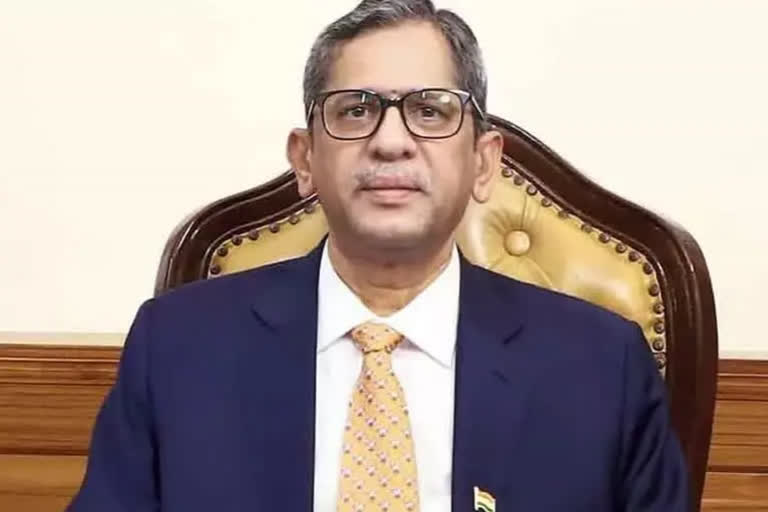New Delhi: The Chief Justice of India, NV Ramana, on Monday, said that once the judges take the oath of the constitution, politics is not relevant and it's only the "constitution that guides us". Justice Ramana was speaking at the '2nd Comparative Constitutional Law Conversation' along with United States Supreme Court Judge Justice Stephen Breyer, who was also a participant in the webinar.
The CJI said that he agreed with Justice Breyer's view that the 'job of the judge is not political'. I really laud the statement of Justice Beyer - 'Job of the judge is not political'. It is a really wonderful statement. Once we have taken oaths of the Constitution, once you start working as a judge, I think politics is no more relevant. It is the Constitution which guides us. This is the principle anywhere, he said.
The CJI was speaking at a webinar organised by the Society of Democratic Rights, New Delhi and Georgetown University Law Centre, Washington DC on the topic Comparative Approaches of Supreme Courts of World's Largest Democracies.
In the webinar, CJI talked on varied topics like poor judicial infrastructure, the inclusion of every sect of society in the judiciary, the importance of PILs in India, the appointment of judges etc. The CJI noted that India has a population of nearly 140 crores, with around 120 languages, thousands of dialects, more than 4000 communities and more than 700 tribes. This social and geographical diversity must find its reflection at all levels of the judiciary as diversity on the bench promotes diversity of opinions and efficiency, he said.
Referring to the inadequate judicial infrastructure, the CJI said from his days of practicing as an advocate, he noticed the poor condition of courts in rural areas.
Also read: Alternative dispute resolution has potential to transform legal landscape: CJI Ramana
"The judicial infrastructure remains the most neglected area. After the British left the country, most courts were not modernised. This is a priority subject for me after I joined the office as CJI... I requested the Government of India to create an infrastructure corporation at state and national levels. The pandemic proved that modern technology has to be an intrinsic part of the system," Justice Ramana said.
Talking about appointments of judges, CJI said that people are under the wrong impression that judges appoint judges. In fact, it's a lengthy process involving the executive as one of the key stakeholders and there could not be a more democratic process than the collegium system.
On the issue of early age retirement of judges, CJI said that the age of 65 is indeed early. He said that at the time of joining the judiciary "we know the date of our retirement". On being asked what he is planning to do after retirement, CJI said, "I am the son of an agriculturalist and left with some land to cultivate. I am a man of people... and I hope I will find the right avenue to invest energy. Retirement from the judiciary does not mean retirement from public life."
"One thing I can say for certain, retirement from judiciary doesn't mean I will retire from public life. Currently, I am too busy to think about my future retirement plans," the CJI said.
(With inputs from agency)



